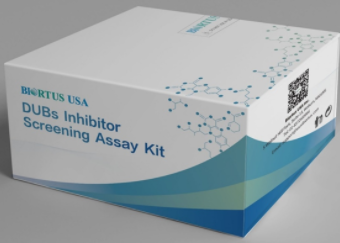DUBs Kits
Product Introduction

Ubiquitination and deubiquitination are two important physiological processes in the ubiquitin-proteasome system, which are responsible for the degradation of intracellular proteins. The deubiquitinating enzyme (DUB) family contains approximately 100 proteins that remove ubiquitin from various substrates. Deubiquitinating enzymes (DUBs) are widely involved in regulating various cellular processes, such as cell proliferation, autophagy, DNA damage repair, and immune responses. They play important roles in the occurrence and development of malignant tumors, neurodegenerative diseases, and other immune-related diseases.
In addition, some bacteria and viruses, such as SARS-CoV, also express pathogenic DUBs to inhibit the host immune response and increase their chances of survival and replication. Therefore, DUBs represent new candidates for targeted drug development.
Product Features
In this kit, various ubiquitin derivatives conjugated with fluorescent groups have been reported as substrates for biochemical DUB assays. Ubiquitin-Rhodamine 110 (Ub-Rho110) is a fluorescent rhodamine-based substrate. Ub-Rho110 is a ubiquitin substrate with a C-terminal derivative of Rho110. Although rhodamine is present in the Ub-Rho110 fragment, it is disubstituted, thus quenching its inherent fluorescence. However, the monosubstituted rhodamine, which is released by DUBs, shows strong fluorescence, allowing for the sensitive and real-time monitoring of DUB activity. After excitation at 485 nm, DUBs can be monitored by measuring the emission at 535 nm. With these longer wavelengths, the risk of artifacts in autofluorescence is reduced. The increase in fluorescence is proportional to the DUB activity.
 Experimental Tools
Experimental Tools 
